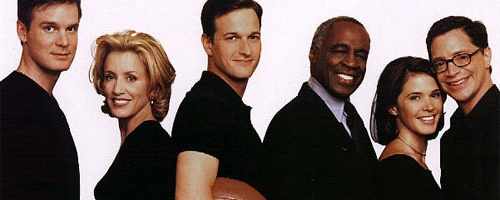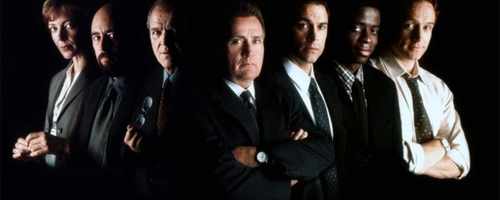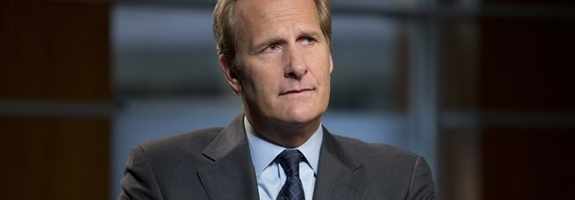The Aaron Sorkin Experience
The upcoming season 2 premiere of HBO’s The Newsroom will be the beginning of yet another television experience brought to life by the ultra-successful television & film writer, Aaron Sorkin. Along with the writer will no doubt come an uninhibited amount of criticism, especially with his show now being on the sacred medium of HBO programming.
There’s not much doubt the writer will continue his typical style of sanctimonious writing with snappy and witty dialogue and critics world wide (or maybe just here in the U.S. will continue to pan the show for it’s weaknesses without a millimeter of mercy, and I’m sure many of these critics will be able to back up their opinions with well-thought-out pieces of writing, but the truth is that critics will have little impact when it comes to the audience of The Newsroom because the question with Aaron Sorkin television isn’t actually whether it’s quality television (a lot of the time it is) or whether it’s too idealistic (it often is). The question with Aaron Sorkin television is whether or not the audience enjoys the Aaron “Sorkyness” of the writer’s programs.

In case I’ve lost some of my own audience with the made up adjective for the writing style of the man who wrote brilliant screenplays for films like The Social Network, Moneyball, and even A Few Good Men, allow me to explain. Sorkin has a very recognizable style of writing, especially when it comes to television, with which he exudes an almost unnatural amount of wit in just about every character that comes on screen. While the dialogue is entertaining, this type of style can sometimes come off as pompous and it can become taxing listening to people talk in a manner so unnaturally spry.
Of course the writing style of Sorkin certainly has it’s perks and it allows for an astounding amount of wonderful entertainment. The dialogue is certainly something that allows some very good performers to show off some of there strengths and with the right setting, the relentless wit sometimes becomes a strength. For instance, with the aforementioned Social Network, which is, in this writer’s opinion, the best thing Sorkin has ever done, there is plenty of room for his writing to work in an environment of geniuses and the cold, calculated behavior of Jesse Eisenberg’s Zuckerberg is a character that fits extremely well with the style of speech (I believe the direction from David Fincher had something to do with the success of the script as well though).
Now, with two unsuccessful attempts at television (Sports Night, Studio 60) and what is likely to be 2 successful shows, (West Wing, Newsroom) I don’t see a Jeff Daniels vehicle on HBO becoming unsuccessful, let’s take a brief look back at the history of the celebrated writer’s television career, starting with his first show.
Sports Night

Sports Night is a program about the behind the scenes happenings on a sports program (much like ESPN’s Sportscenter). The show ran for 45 episodes on ABC while struggling to find an audience. Sorkin did have an opportunity to move the show to a few other networks, including HBO and Showtime, but decided to leave it alone due to the next show on this rundown. For those unfamiliar with Sports Night it is a show much like all Aaron Sorkin shows. In fact, I have a feeling that if one knew who Aaron Sorkin was and had a familiarity with his other work, Sports Night would be easily recognizable as a Sorkin product.
The show suffered through 2 seasons at ABC, beginning with the presence of a laugh track (which many people nowadays associate with bad shows) but eventually tuning it out. The cast included some people who are very good fits for the incorporated writing style. The notable performers were Peter Krause from HBO’s Six Feet Under, the wonderful Felicity Huffman of Desperate Housewives fame, and Joshua Malina, who seems to be an Aaron Sorkin show favorite (although I always found his characters nearly unbearable).
Sports Night contained many of the Sorkin tropes that are apparent in his more recent program. The universal ideals, complicated but not really questions, the fast-talking people, and the blubberingly condescending romance angles.
If this weren’t an Aaron Sorkin show it would scream cult hit (it may even be considered one anyway) and is an early example of just how similar Mr. Sorkin’s shows are to on another. It also led to the show that Aaron Sorkin chose to pursue in it’s stead… not to mention one of the more beloved television programs of all time. One could easily compare this show to the earlier work of a musician who sold out before hitting it big (by the way I would disagree with anyone who actually thought Sports Night was better than The West Wing).
The West Wing

In case you haven’t heard about this old NBC classic that ran 7 years, it’s generally considered one of the best network dramas in the history of the world, and one of the reasons the Sorkin name comes with so much clout. There are plenty of reasons why the show was so successful.
Let’s start with the cast. First of all, there’s Martin Sheen being awesome as the President of the United States (POTUS). John Spencer as Chief of Staff Leo McGarry, who was essentially the heart of the show, since it was about the White House staff. Bradley Whitford (whom my generation will probably know better as the villain from Billy Madison, and don’t even try to deny it!) plays Deputy Chief of Staff Josh Lyman. The great Allison Janney plays Press Secretary C.J. Cregg. Richard Schiff is the grumpy idealistic Communications Director Toby Ziegler. And none other than the amazing Rob Lowe plays Deputy Communications Director Sam Seaborn. There are others, but this is the core of one of the most phenomenal casts assembled for a network drama.
All of these performers were great fits in this show not only because of their acting ability, but also because of how their styles coincided with the style of Sorkin writing. They are all very good at talking fast (something Rob Lowe has proven time and time again on Parks & Recreation more recently). The style was also fitting for the setting of the program, inside the White House, where one would hope to only see smart people working.
The cast truly aided in bringing out the best in the writing and helped the show to be named the 10th best written TV series by the Writers Guild of America. It’s hard to imagine the show as being as charming and as real as something of it’s nature could get without the combination of Sorkin’s writing and the performances brought to the forefront by the particular actors that were chosen.
The show ran 7 seasons, the first 4 of which were written by Aaron Sorkin.
Studio 60 on the Sunset Strip

Studio 60 was essentially the same TV show as Sports Night but instead of getting a second season, this quintessential Sorkin show was basically a flop. It started with a very strong pilot episode (all of Sorkin’s pilots are good though) and slowly lost momentum as it’s one and only season moved along.
The show brought back West Wing star Bradley Whitford to star as Danny Trip to be alongside the seemingly perfect fit for Sorkin programming, Matthew Perry, to play Matt Albie. The two characters are brought into the mix of a struggling sketch comedy show (a la SNL). Amanda Pete, who I’ve mostly enjoyed throughout her career was cast as Jordan McDeere the president of entertainment programming for the fake network, NBS.
This show made the mistake of becoming very heavy-handed and resembles much of the first season of The Newsroom. What started out as a more intimate program became an hour long (or 45 minute taking out commercials) experience that played more and more like a movie of the week about some longtime controversial topic.
I did enjoy watching the single season on Netflix when it was available, however this show had run it’s course and it needed to be ended.
The Newsroom

Last, but certainly not least (although maybe) is The Newsroom, which is scheduled to premiere its second season on Sunday, July 14th. The Newsroom is about pretty much exactly what one would expect it to be about… relationshi… I mean, what happens behind the scenes of a cable news network.
The truth about The Newsroom and possibly all of Aaron Sorkin’s shows is that they are all essentially the same show, but in different settings. Albeit the ones not named The West Wing are hung up on clumsy romances (admittedly The West Wing did have those moments).
While I do agree this particular show often shares a very unrealistic idealistic attitude towards how news should work, I honestly find myself not caring all that much about whatever sanctimonious lesson is trying to be taught in any given week. In all seriousness, I really just want to watch Jeff Daniels be a sophisticated smart-ass delivering sophisticated smart-ass lines written by Aaron Sorkin. That’s what I want from The Newsroom and I don’t think I’ll be disappointed, however many seasons it lasts.
In reality, when it comes to Aaron Sorkin, whatever the material may be, it’s probably at least worth taking a look at because he is an enormously talented writer. I personally feel that his last two films are instant classics (no matter how many times I watch Moneyball I remain impressed).
I do hope many of the weaknesses of the first season of Newsroom are at least adjusted with this upcoming season, because I’d like to see the show go on a fairly long run. I guess only time will tell, but as long as Jeff Daniels is doing his Jeff Daniels thing on the Newsroom, I’ll be watching.

Some other quick thoughts:
* The rest of the Newsroom cast isn’t too bad either. Olivia Munn was particularly good last year.
* I feel bad Studio 60 went the way it did because I’ve always felt Matthew Perry could be a very good lead in a show.
* I actually have seen every episode of all four shows on here. As soon as The West Wing became available on Netflix I pushed through all 7 seasons in about 2 months.
* Joshua Malina seriously got on my nerves on both shows in which he appeared.
* All of the pilots to the shows range from very good to excellent. It makes me think there’s a preparation issue with The Newsroom because HBO schedules aren’t like the network schedules and would allow more time to complete the writing process.
* Yes, Sorkin does not write women well at all. I’m just saying.
* Rob Lowe + Parks & Recreation = Comedic gold. I just had to mention that show again.
What do you think? Leave a comment.











15 minutes into The Newsroom pilot and I am telling this without any exaggeration, I was hooked. There is no denying that the show has its share of dramatic moments and can’t be considered a completely realistic account of the modus operandi of a newsroom but still I love this fresh take on media. Where is season 2?!
I first get to know the name ‘Aaron Sorkin’ when I was watching the West Wing. Best TV drama I’ve watched and I was also disappointed by Studio 60’s second-half of the season. I hope the Newsroom won’t be a let down.
Great read! I’m looking forward to season 2 of Newsroom — the more an episode’s plot is focused on news, the better. But it’s worth hanging in, he may be the smartest mind in television.
Whilst I loved The West Wing, I felt The Newsroom a tad too patriotic, and after the Osama death episode I admit I had to stop watching. I found it nauseating. I understand that Americans, and especially New Yorkers, would feel like maybe celebrating but I thought the party atmosphere was too much. Plus it is all too romantic.
Great article though.
Peter
Believe me. I understand much of the hate The Newsroom gets and the potential relationship between whatshisname and whatsherface (names I often attribute to characters I stop caring about) bored me to death. I just like seeing Jeff Daniels in a lead so much that I can’t stop watching.
You have a great article here. I think the reason why Sorkin can be a mixed bad, i.e. a good television show here and a poorly written movie there, is because he sometimes writes dialogue for the sake of dialogue without considering characterization. It as if any character can be swapped with another as long as the dialogue is there, which often makes for lazy writing. Nevertheless, good piece.
I actually prefer his writing in Moneyball and The Social Network but I think that might be in spite of him, because in those films there seems to be a certain level of restraint that is less common in his television.
Sorkin’s writing is not for everyone.
While I enjoy his writing style, I have friends that find it irritating (all college educated+ people). It’s like any other show – some people enjoy it, some don’t. He writes in a fast paced manner, with the assumption that you are a fairly intelligent person with knowledge of current events. Although I do think he goes to excessive lengths to have characters explain the content to viewers.
I think it’s worth mentioning that most of his shows focus on the “backstage” happenings of a given industry. I think most people would agree that most workplaces have a specific jargon that they use to communicate and often have quick, abbreviated conversations in the normal course of business.
Agreed that jargon is a given in professions. I feel Sorkin has difficulties differentiating the jargon though given how similar all his shows seem to be on the dialogue side. It would be interesting to watch 1 of each tv show episodes right next to each other to see how similar the characters and plot actually are.
A good article, and as a Sorkin fan I hope the second series of the Newsroom is as good as the first. Personally I felt that Studio 60 deserved another series, if only for the Matthew Perry/Bradley Whitford double act.
One issue I have with The Newsroom (and really, there are so many), is that where The West Wing was able to provide social commentary ahead of time – for example, Sam’s speech about privacy being the next big political issue in The Short List – The Newsroom dishes out mildly insightful social commentary months after the real news events have happened. And we’ve heard it all a thousand times better said on The Daily Show by that point. The West Wing chose the episodes’ debates based on whether or not Sorkin had something to write about, and that meant he had the freedom to think more broadly – and is why, still today people reference West Wing episodes when certain news stories come out. He didn’t have to wait until whatever social issue became relevant.
Also, I really don’t get the Jeff Daniels appeal. I find Will insufferable.
Yes, you’ve pointed out what I believe to be the main problem with the show in that it loses it’s dramatic effect basically be default due to the nature of the show.
The character of Will is definitely problematic. Trying so hard to label him as a registered Republican seems like a feeble attempt to get people to not think this show leans to the left.
I don’t blame any of the actors themselves though because I believe the entire cast is incredibly talented, and not only Daniels, but Emily Mortimer, Allison Pill, Olivia Munn, and many others are performers that can add something even to the worst characters.
Of course I admire the brilliance of Aaron Sorkin’s writing and study it to help my own, but it does become, after a while, too clever by half (as in Steve Jobs). I long for a character that isn’t smart-assed, who can’t respond with quick one-liners, for some space, some quiet.
Personally, though I think West Wing is a decent quality show, I think it is overrated for the quality it is.